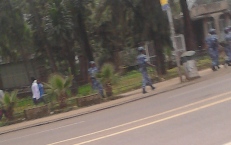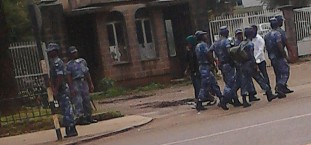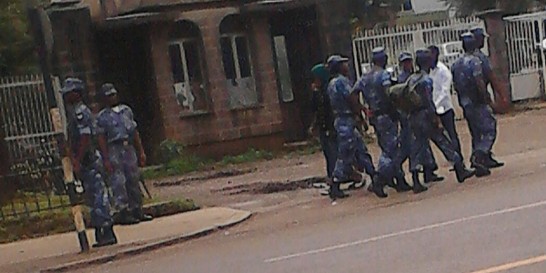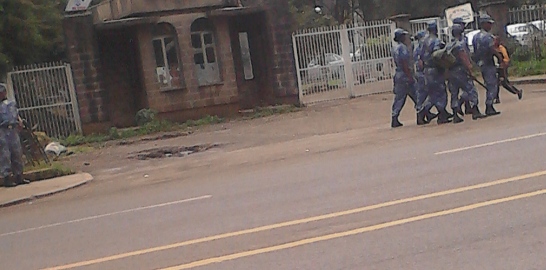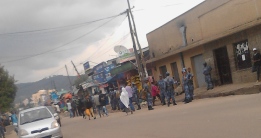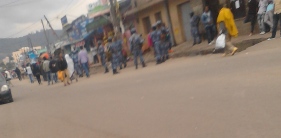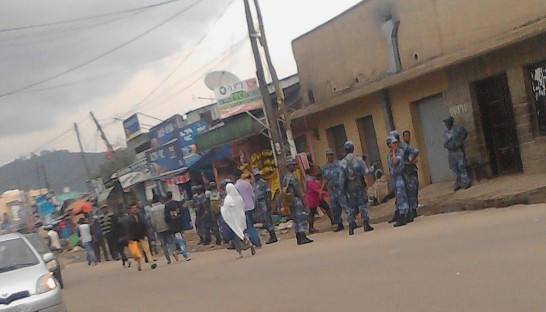
Rosa Anyango poses near the ancestral home of President Obama in Nyangoma village in Kogelo, west of Kenya’s capital of Nairobi. (Thomas Mukoya/Reuters)
By Juliet Eilperin and David Nakamura
The Ethiopia visit has raised hackles among human rights advocates who question the administration’s level of concern about human rights, as it seeks to advance new security and economic goals on a continent where good governance and democratic freedoms often do not top the priority list. But to others it reflects the evolution of America’s relationship with the continent, which now offers opportunities for the United States in a way it didn’t decades ago when it was primarily an aid recipient.
“The decision to go to Ethiopia greatly undermines the stated goals and commitments of this administration when it comes to support for human rights, the rule of law and good governance in Africa and beyond,” said Sarah Margon, Human Rights Watch’s Washington director. “It shows that it ranks priorities and shows that security and development often trump human rights concerns, which is a very short-sighted policy approach.”
Dozens of journalists left Ethiopia last year, saying they faced threats from the government because of the work they do. In April 2014 the government charged seven bloggers known as Zone 9 and three reporters under the country’s anti-terrorism law; a few months later the owners of six private publications were charged under Ethiopia’s criminal code. In early July the government released two bloggers and four journalists, though according to the Committee to Protect Journalists at least a dozen members of the media remain jailed on terrorism charges.
Ethiopia’s ambassador to the United States, Girma Biru, described Obama’s decision to visit his country as “confirmation of the strong relationship that’s been built between the two countries.”
Biru said prosecuting journalists was not evidence of human rights violations. “If a journalist, or a teacher, or a professor, or a farmer is supporting these types of groups to instigate violence, then he should be charged,” he said. “But the fact that he is carrying the name of ‘journalist’ should not save him from being charged on this ground.”
White House aides acknowledge that visits like the one to Ethiopia can bestow a measure of credibility to foreign governments and often use the lure of a presidential visit to win diplomatic concessions from non-democratic and repressive regimes.
Obama often meets with members of civil society during his overseas visits, as a way of encouraging independent groups to pursue their goals in the face of government opposition.
Grant Harris, the senior director for Africa at the National Security Council, said in a statement that the United States and Ethiopia have “a relationship that spans many issues” and the administration has been “exceedingly frank and candid” about its concerns about the government’s targeting of dissidents and reporters.
And some experts say that Obama must weigh human rights against other important factors.
Princeton Lyman, who served as U.S. special envoy for Sudan and South Sudan from 2011 to 2013 and did stints as the U.S. ambassador to Nigeria and South Africa, said that the United States must now consider the opportunity for investment in Africa even as the continent has become increasingly important for national security reasons, in the fight against international terrorists and other destabilizing regional forces.
“The question for policymakers is, how do you balance these different interests when they sometimes run up against each other?” Lyman said.
The Obama trip will try to balance several of those interests: In Ethiopia he will visit the Addis Ababa headquarters of the African Union, which has played an increasingly active role in trying to maintain regional and economic stability in the region. The Ethiopia stop will follow a visit to the Global Entrepreneurship Summit, which is being held this weekend in Kenya, where Obama’s father was born.
Kenya has made strides in recent years with increasingly democratic elections, though it has still come under fire for its restrictions of two Muslim groups on the coast, Haki Africa and Muslims for Human Rights, and abuses by members of its security forces.
But Samuel R. Berger, who served as President Bill Clinton’s national security adviser and is currently co-chair of the Albright Stonebridge Group, said one cannot view foreign policy through the single lens of human rights. “The world is too complicated right now, and too dangerous in this part of the world, to think of human rights and security as an either-or proposition.”
When President George W. Bush was contemplating a trip to Vietnam in 2006, it set off similar questions inside the White House, said Joseph Hagin, director of operations in the Bush White House.
“The real key on any of these trips is, ‘What’s the deliverable? What good would the visit do?’” Hagin said. “If you think you’re going to get a commitment to change behavior, and you think that’s valuable, that could be enough to go.”
Hagin said that in the end, Bush aides concluded that Hanoi had made enough progress on opening its economy that the trip would be beneficial. Bush visited the nascent stock market in Ho Chi Minh City and used a red mallet to strike a gong that opened trading on the day he arrived.
Obama is reportedly considering a trip to Vietnam during a planned Asia tour this fall. Vietnam is one of the 11 nations negotiating with the United States on the Trans-Pacific Partnership, an expansive free trade deal that Obama has placed high on his second-term agenda. But human rights advocates protested this month when the president played host to Communist Party Secretary Nguyen Phu Trong at the White House.
Foreign policy experts said a Vietnam visit makes sense for a president who has already made history in Southeast Asia, becoming in 2012 the first U.S. president to visit Burma, also known as Myanmar. His stop in Malaysia in 2014 was the first by a sitting president since Lyndon B. Johnson in 1967.
During his April 2014 visit, Obama pressed the Malaysian government, which is also part of the TPP deal, to improve its human rights record during a town hall-style appearance with young activists but declined to meet with opposition leader
Anwar Ibrahim.
“You can’t expect an American president to go solve Malaysia’s problems in Malaysia. Malays have to solve them,” said James Keith, who served as U.S. ambassador to Malaysia from 2007 to 2010.
And presidential human rights advocacy has clear limits. Ahead of Obama’s historic visit to Rangoon, Burma, in 2012, the nation’s ruling military junta released dozens of political prisoners, and President Thein Sein agreed to allow human rights advocates to inspect prisons. Obama met with democracy icon Aung San Suu Kyi, who had been released two years earlier after 15 years of house arrest, and he gave a speech at Yangon University saying the “flickers of progress . . . must become a shining North Star for all this nation’s people.”
But by the time Obama returned to Rangoon — and to the capital of Naypyidaw — last fall, many of those political gains had been reversed. Thein Sein’s regime had jailed journalists and political activists, Suu Kyi was banned from running in this fall’s presidential election and violence was displacing tens of thousands of Muslim Rohingya in the countryside.
“One has to recognize that more and more, ever since the Cold War ended, the value to foreigners of an American visit — our ability to influence change — has gone down,” Keith said. “It’s the rise of the rest. It’s not American decline. It’s just natural.”
Once the Africa trip is over, the White House will have more difficult decisions to make regarding presidential travel, such as whether Obama should visit Cuba now that the two countries have normalized relations. Asked on Friday what the United States would need to see from the Cuban government before Obama would visit, White House press secretary Josh Earnest rattled off a long list of human rights initiatives.
“We would like to see the rights of political opponents of the Cuban government inside of Cuba not be thrown in jail just because of their political views,” he said, adding, “A respect for a free and independent media would be another step that we would like to see them take.”
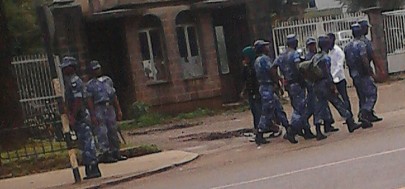 Mootummaan abbaa irree, Wayyaanee jibba uummata Oromoo irraa qabuun hidhaa fi ajjeechaan gahuu dadhabnaan yeroo ammaa uummata nagaa mana isaa keessa jiraatu iyyama koo malee mana ijaartan jechuun humna tikaan fi waraanan mana jireenyaa qonnaan bultoota godina addaa Oromiyaa Buraayyuu bakkeewwan addaa Tsarra Tsiyoon,Gafarsaa Buraayyuu, Annee Diimaa fi kaanis mannen qonnaan bultoota 400 ol tahu diiguun hiraarsaa jira. Haala kanaan kanneen qabeenyaa isaanii kana dura dhaabbatanii falman ammoo hidhaa umurii dheeraa garagaraan itti murteessaa jiraachuu Qeerroon gabaasee jira.
Mootummaan abbaa irree, Wayyaanee jibba uummata Oromoo irraa qabuun hidhaa fi ajjeechaan gahuu dadhabnaan yeroo ammaa uummata nagaa mana isaa keessa jiraatu iyyama koo malee mana ijaartan jechuun humna tikaan fi waraanan mana jireenyaa qonnaan bultoota godina addaa Oromiyaa Buraayyuu bakkeewwan addaa Tsarra Tsiyoon,Gafarsaa Buraayyuu, Annee Diimaa fi kaanis mannen qonnaan bultoota 400 ol tahu diiguun hiraarsaa jira. Haala kanaan kanneen qabeenyaa isaanii kana dura dhaabbatanii falman ammoo hidhaa umurii dheeraa garagaraan itti murteessaa jiraachuu Qeerroon gabaasee jira.